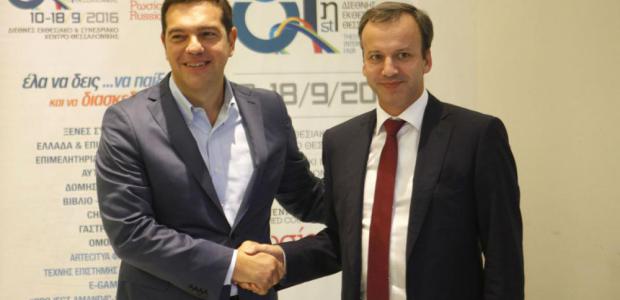Moscow is seeking to revive as swiftly as possible an agreement reached with Greece for Turkish Stream – Russia’s pipeline crossing proposal through the Black Sea to the Greek-Turkish border, an initiative stalled by the Russian-Turkish political crisis – meetings by Greece’s leadership with Russian officials in Thessaloniki on Saturday indicated.
Prime Minister Alexis Tsipras and Energy Minister Panos Skourletis held respective meetings with Russian Deputy Prime Minister Arkady Dvorkovich and Russian Energy Minister Alexander Novak.
At these meetings, the two sides reiterated that if Turkish Stream – dubbed Greek Stream for its local segment – makes progress, mixed consortiums would be formed, most probably with DEPA, the Public Gas Corporation, included, as had been agreed to in 2015, when the Turkish Stream pipeline proposal was first tabled for discussion.
Bypassing Kiev, and punishing Sofia for having obstructed the construction of scrapped South Stream, the new Turkish Stream pipeline is planned to travel across the Black Sea to the Turkish city of Ipsila, close to the Greek-Turkish border, before a Greek segment runs across Greece’s north to the Adriatic Sea.
Though Greek government officials confirmed that Turkish Stream and its extension through Greece to Italy is a plan on the table, they admitted the chances of it being developed in the near future are minimal. However, Greek officials acknowledged that the recent restablishment of bilateral Russian-Turkish ties does provide some prospects for the project.
Ankara has once again declared a strong interest in the project’s development. It is believed that Gazprom has already been issued initial licenses.
Tsipras, speaking at the Thessaloniki International Fair over the weekend, may have reiterated Greece’s interest in becoming an energy hub of multidimensional energy policies, but it has become clear over the past year, especially since the launch of work on the TAP project last May, that the country’s energy interests are pointed towards the west.
The TAP pipeline, to cross northern Greece as part of the route carrying Azeri natural gas to Europe, via Italy, as well as the prospective IGB Greek-Bulgarian Interconnector, are two key projects being supported by the west, which wants to diversify Europe’s energy sources.
The Turkish Stream proposal reemerged in August when Russian President Vladimir Putin and his Turkish counterpart Recep Tayyip Erdogan gave the project the green light.





